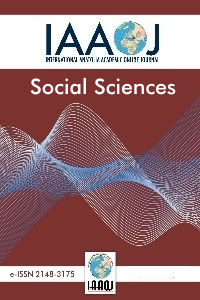Öz
Türk Vergi Sisteminde, aile bağlantılı hükümlere kimi
zaman, sosyal devlet açısından mükellef lehine kimi zaman da vergi güvenlik
önlemi olarak devlet lehine yer verilmiştir. Bu düzenlemelerde, bazen sadece eş
çocuk bazen bunlara ilaveten kan ve sıhri hısımlar , bazen, alt ve üst soy,
bazen daha da geniş olarak, evlatlık ve evlat edinen de aile kavramı içinde yer
almıştır.Çalışmanın amacı aile kavramındaki farklılıkların saptanması, bu
farklılıkların amaçlarının tespit edilmesi, eşitlik ve adalet kriterleri
açısından değerlendirilmesi ve değişiklik önerilerinin getirilmesidir. Konu
literatürde ilk kez incelenmekte olup, bu konuda ne bir makale ne de bir yargı
kararı bulunmadığı için, aile kavramına
atıf yapan maddeler, temel hukuk kavramları olan , sosyal devlet ve vergi
güvenliği açısından kişisel olarak hukukun temel ilkelerine bağlı olarak
değerlendirilmiştir. Sonuç olarak hem
sosyal devlet açısından aileyi koruyan hükümlerde, hem de vergi güvenlik
önlemine yönelik hükümlerde yasa boşlukları tespit edilmiş ve düzenleme
önerilmiştir. Yeni düzenlemede sosyal devlet amacıyla yapılmış olanlara,
evlatlık evlat edinen kardeş kavramlarının eklenmesi, vergi güvenlik önlemi
amacıyla getirilen düzenlemelere ise, nişanlı, eski eş, evlatlık ve evlat
edinen kavramlarına ilaveten aileyi aşacak şekilde mansup mirasçı, kanuni
temsilce ve umumi vekilin eklenmesi önerilmiştir.
Anahtar Kelimeler
Sosyal devlet vergi güvenliği kan ve sıhri usul fürü evlatlık evlat edinen
Kaynakça
- Acabey. M.B. Zevkliler, A., Gökyayla E., (2000). Medeni Hukuk: Seçkin Yayıncılık.
- Ağar, S. (2011). Transfer Fiyatlaması Örtülü Kazanç Dağıtımı, Ankara: Yaklaşım Yayıncılık.
- Ateş, L. ( 2011). Transfer Fiyatlandırması ve Vergileme, Ankara : Turhan Kitabevi.
- Özdemir, T. (2016). Üvey evlat Asgari Geçim indiriminden faydalanabilir mi? http://www.tanerozdemir.com.tr/uvey-evlat-asgari-gecim-indiriminde-faydalanabilir-mi-vergisel-acidan-bakis.html, ( 17.11.2018).
- Bulutoğlu, K. (1976) Türk Vergi Sistemi 1976, Ankara: Ekin Yayınları.
- Dural, M. Ve Öz, T. (2018). Türk Özel Hukuku, Miras Hukuku, C.4, İstanbul: Filiz Kitabevi.
- Kızılot, Ş. (2001). Türk Vergi Hukukunda Örtülü Kazanç, Ankara:Yaklaşım Yayıncılık.
- Oktar, A. (2018). Türk Vergi Sistemi, 2.B., İstanbul: Türkmen Kitabevi.
- Öncel, M. ( 1978). KVK Açısından Sermaye Şirketlerinde Örtülü Kazanç ve Örtülü Sermaye, Ankara 1978, Banka ve Ticaret Hukuku Araştırma Yayınları.
- Seviğ, V. (2007). Gelir Vergisi Mükelleflerinde Emsal Fiyat yada Bedel.
- http://www.denetimnet.net/UserFiles/Documents/Makaleler/Veysi%20Sevi%C4%9F/Gelir%20Vergisi%20m%C3%BCkelleflerinde%20emsal%20fiyat%20veya%20bedel%20.pdf (10.10.2018.)
- Sonsuzoğlu, E. (2008). Ayırma İlkesinin Adı Mı Değişti? Asgari Geçim İndirimi, Yaklaşım Dergisi. (184): 28-32.
- Sonsuzoğlu, E. ve Işık, H. (2017). Considerations of “Related Party,” in Disguised Earning Distribution via Transfer Pricing. Handbook of Research on Global Enterprise Operations and Opportuities, İçinde 6. Bölüm, 36-60. IGI Global. USA.
- Şenyüz, D. Yüce, M., ve Gerçek, A. (2018). Türk Vergi Sistemi, . 15. B. Bursa: Ekin Kitabevi.
- Yaltı B. (2009). Transfer Fiyatlandırmasında Gizli Emsal, Vergi Sorunları Dergisi, (251), 1-19.
Öz
The Turkish tax service in relation
to family management is sometimes organized in favor of the taxpayer with the
understanding of social state and sometimes in accordance with the tax security
regulation in favour of the state. In these regulations, family is sometimes
composed of only spouse and children, sometimes in addition to these, first
degree relatives, and sometimes siblings, relationships through marriage,
asendants and descendants, sometimes second degree relatives, as well as
adopted child, adoptive parents, ex-partners and fiancee. The aim of this study
is to determine the differences in defining family relations in various tax
laws and objectives of their difference, to evaluate these differences in terms
of equality and justice and to make proposals. the subject is examined for the
first time in the literature. since neither the article nor the judicial
decision were made in this regard, the articles referring to the concept of
family were considered to be based on the basic principles of law, in terms of
basic legal concepts, social state and tax security. As a result, legal gap
have been identified and new regulations have been proposed in the provisions
protecting the family in terms of the social state as well as in the provisions
regarding the tax security measure. In the new regulation, it is proposed to
add the concepts of adoptive and adoptive and brother and fiance, for social
state regulations. For tax security regulations, it is proposed to adopt the concepts
of ex-wife, engaged, adopted, adoptive and family, as well as heir, heir and
heir.
Anahtar Kelimeler
Sosial state tax security. ascendant and decendant relative by marriage adapted child
Kaynakça
- Acabey. M.B. Zevkliler, A., Gökyayla E., (2000). Medeni Hukuk: Seçkin Yayıncılık.
- Ağar, S. (2011). Transfer Fiyatlaması Örtülü Kazanç Dağıtımı, Ankara: Yaklaşım Yayıncılık.
- Ateş, L. ( 2011). Transfer Fiyatlandırması ve Vergileme, Ankara : Turhan Kitabevi.
- Özdemir, T. (2016). Üvey evlat Asgari Geçim indiriminden faydalanabilir mi? http://www.tanerozdemir.com.tr/uvey-evlat-asgari-gecim-indiriminde-faydalanabilir-mi-vergisel-acidan-bakis.html, ( 17.11.2018).
- Bulutoğlu, K. (1976) Türk Vergi Sistemi 1976, Ankara: Ekin Yayınları.
- Dural, M. Ve Öz, T. (2018). Türk Özel Hukuku, Miras Hukuku, C.4, İstanbul: Filiz Kitabevi.
- Kızılot, Ş. (2001). Türk Vergi Hukukunda Örtülü Kazanç, Ankara:Yaklaşım Yayıncılık.
- Oktar, A. (2018). Türk Vergi Sistemi, 2.B., İstanbul: Türkmen Kitabevi.
- Öncel, M. ( 1978). KVK Açısından Sermaye Şirketlerinde Örtülü Kazanç ve Örtülü Sermaye, Ankara 1978, Banka ve Ticaret Hukuku Araştırma Yayınları.
- Seviğ, V. (2007). Gelir Vergisi Mükelleflerinde Emsal Fiyat yada Bedel.
- http://www.denetimnet.net/UserFiles/Documents/Makaleler/Veysi%20Sevi%C4%9F/Gelir%20Vergisi%20m%C3%BCkelleflerinde%20emsal%20fiyat%20veya%20bedel%20.pdf (10.10.2018.)
- Sonsuzoğlu, E. (2008). Ayırma İlkesinin Adı Mı Değişti? Asgari Geçim İndirimi, Yaklaşım Dergisi. (184): 28-32.
- Sonsuzoğlu, E. ve Işık, H. (2017). Considerations of “Related Party,” in Disguised Earning Distribution via Transfer Pricing. Handbook of Research on Global Enterprise Operations and Opportuities, İçinde 6. Bölüm, 36-60. IGI Global. USA.
- Şenyüz, D. Yüce, M., ve Gerçek, A. (2018). Türk Vergi Sistemi, . 15. B. Bursa: Ekin Kitabevi.
- Yaltı B. (2009). Transfer Fiyatlandırmasında Gizli Emsal, Vergi Sorunları Dergisi, (251), 1-19.
Ayrıntılar
| Birincil Dil | Türkçe |
|---|---|
| Bölüm | Makaleler |
| Yazarlar | |
| Yayımlanma Tarihi | 27 Haziran 2019 |
| Yayımlandığı Sayı | Yıl 2019 Cilt: 5 Sayı: 2 |
Dergimizin Tarandığı İndeksler









International Anatolia Academic Online Journal / Sosyal Bilimler Dergisi
e-ISSN 2148-3175

